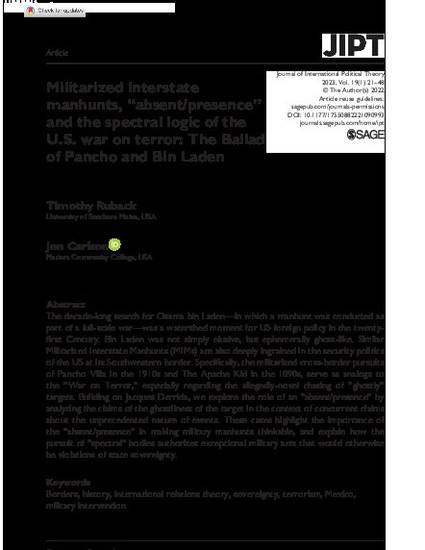
Article
Militarized Interstate Manhunts, the "absent/presence" and the spectral logic of the U.S. War on Terror: The Ballad of Pancho & Bin Laden
Journal of International Political Theory
(2023)
Abstract
The decade-long search for Osama bin Laden—in which a manhunt was conducted as part of a full-scale war—was a watershed moment for US foreign policy in the twenty-first Century. Bin Laden was not simply elusive, but ephemerally ghost-like. Similar Militarized Interstate Manhunts (MIMs) are also deeply ingrained in the security politics of the US at its Southwestern border. Specifically, the militarized cross-border pursuits of Pancho Villa in the 1910s and The Apache Kid in the 1890s, serve as analogs to the “War on Terror,” especially regarding the allegedly-novel chasing of “ghostly” targets. Building on Jacques Derrida, we explore the role of an “absent/presence” by analyzing the claims of the ghostliness of the target in the context of concurrent claims about the unprecedented nature of events. These cases highlight the importance of the “absent/presence” in making military manhunts thinkable, and explain how the pursuit of “spectral” bodies authorizes exceptional military acts that would otherwise be violations of state sovereignty.
Keywords
- Borders,
- history,
- international relations theory,
- sovereignty,
- terrorism,
- Mexico,
- military intervention
Disciplines
Publication Date
Winter February, 2023
Citation Information
Timothy Ruback and Jon D. Carlson. "Militarized Interstate Manhunts, the "absent/presence" and the spectral logic of the U.S. War on Terror: The Ballad of Pancho & Bin Laden" Journal of International Political Theory Vol. 19 Iss. 1 (2023) p. 21 - 48 Available at: http://works.bepress.com/jondcarlson/42/
